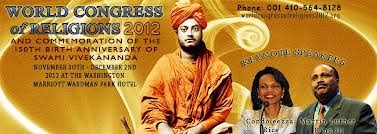By Grove Harris
VIVEKANANDA'S SPIRIT ALIVE IN WASHINGTON DC
Swami Vivekananda
The World Congress of Religions 2012 was held in Washington, DC, November 30-December 2, 2012. It celebrated the 150th birth anniversary of Swami Vivekananda, honoring his legacy of peacemaking, human rights, ending poverty, and women’s empowerment. Speakers paid homage to Swamiji as a visionary spiritual leader who introduced Eastern religion to the West. His image graced every session, and according to Dr. Pradip Ghosh, chairperson of the Congress, “Swami Vivekananda’s ideals of universal acceptance go a long way to foster peace and harmony among people of different faiths.”

The opening session included music and a keynote speech by contemporary visionary Martin Luther King III. He made numerous comparisons between the work of his father Martin Luther King Jr. and of Swamiji, reiterating the need for non-violence as we strive for justice and equality. He spoke of forgiveness, and his life speaks loudly, as he carries on without bitterness over the murder of his father. The power of non-violence as a transformative strategy is an enduring truth. In a world with violence promoted on TV, on film, and games with people expressing road rage and more, we desperately need emotional literacy to be able to name and deal with feelings constructively and creatively.
King was the first of many speakers to address the environmental crisis, a significant theme at the Congress. He called for millions to rise up and end pollution in this decade, using non-violent principles and affirming kinship with all life. Dr. Bharat Gupt emphasized that we are in a crisis of consumerism where our very life is unsustainable. He claimed Swamiji would emphasize this the most, were he here today. Dr. Rajwant Singh spoke of his religiously based environmental work with www.ecosikh.org. Dena Merriam discussed domination in our consumerist attitudes towards the environment, calling for a change of paradigm, to see rivers and trees as energy and life forms, rather than commodities.
Saturday’s three sessions covered issues of peace through “universal acceptance,” spirituality to quiet the mind and provide a starting point for engaging contemporary issues, and considerations of forgiveness as a spiritually transformative act. Women’s empowerment, through education, economic advancement, and leadership, was discussed as a crucial step in changing a set of social problems.
Dr. Sakena Yacoobi traveled from Afghanistan to discuss education issues in her country. Women there are insisting on quality education for their children, so that they may grow into leaders.
Sensei Anthony Shultz discussed profound forgiveness, acknowledging all parts of ourselves, as we are all part of a larger one. The question is how religious traditions help people awaken to this larger understanding.
In her keynote, Dr. Condoleezza Rice offered thoughts on the role of people of faith in making ours a better world. She reflected that democracy is the enshrinement of freedom, which must include all, with protection from the tyranny of the majority. People of faith often make sure that none are excluded and provide the compassion that she claims government cannot deliver.
Sunday morning’s session refreshingly called attention to our inner lives and spiritual practices. The radiant Sister Jenna offered commentary on the power of our thoughts and the necessity of change starting with our individual internal lives. Dr. Iva Carruthers suggested we celebrate diversity and live by the universal ethic of Ubuntu, honoring interconnectedness rather than individuality: I am because of who we are. She pointed out that keynote speakers King and Rice have very different perspectives: King is centered in non-violence, and Rice asserts that government cannot offer compassion. She asks what kind of extremists we will be, for love or for hate?
Dr. Paul Wee addressed our understanding of religious symbols, asking if we can see them as windows to break through to find unity. Ms. Zainab Al-Suwaij shared the story of her own life in Iraq, emphasizing the role of women as leaders and actors in bringing peace to their communities. Richard Foltin discussed religious freedom as safeguarded by separation of church and state, concluding that in public controversy, both sides need to safeguard the religious beliefs of those on the other side. Justice Shymal Sen reiterated that good work we do for the world will ultimately benefit ourselves as well, and that human rights are of ultimate importance.
Tulsi Gabbard
Congressperson-elect Tulsi Gabbard, the first Hindu ever elected to the Untied States House of Representatives, delivered the final keynote. She focused on spirituality as a source of guidance and her core practice of servant leadership and service to humanity. Her track record of service is strong: she served in the Hawaii State Legislature at age 21 and is a decorated war veteran. She co-founded Healthy Hawaii Coalition, an environmental educational group.
Overall, the conference affirmed the role of the interfaith movement as a powerful force for solving social problems. It affirmed the importance of religious and spiritual practices for dealing with life and starting needed changes of consciousness with the self. With keynotes from political figures, the conference broached the interface of religious life and political life. It carried a message of universal acceptance and unity, of engagement with social issues through education, women’s leadership, and justice work on many fronts.
The Congress was organized by the Institute of World Religions of the Washington Kali Temple. Proceedings are going up on their website, along with speakers’ bios. Music and dance rounded out the conference, enjoyed by about 400 participants.



